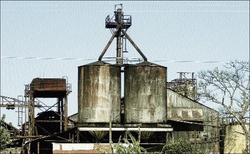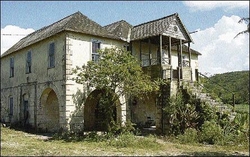
A section of the Hampden Sugar Factory, as seen in January 2006. - File
A commitment by Everglades Farm to pump some US$6.2 million (J$549.8 million) into the Long Pond and Hampden sugar estates has created an air of expectation among former workers in the sugar-dependent communities.
Everglades, owned by the Hussey family, acquired the assets of the Trelawny Sugar Company from the Jamaican Government mid-summer.
The improvements under way are being directed by Ruth Hussey, who, notwithstanding several attempts, was not available to be interviewed.
Visits to the property indicate that the surrounding canefields are being rehabilitated, and while there is some activity under way at the factories, Wednesday Business was unable to ascertain the degree to which they were being retooled.
"The factory is being repaired and planting is going on right around, so it shows that these people are serious about business and this is what we want right now," said 45-year-old Edwin Brown, who was found seated among a group of men in the vicinity of the Long Pond Estate on a visit by Wednesday Business to the Trelawny sugar belt.
Chief sources of income
Both estates figured prominently during the heyday of sugar production in western Jamaica and, at one time, were chief sources of income for residents of Clark's Town and other Trelawny communities.
However in the last two decades, sugar hit a steady decline and the estates and their equipment aged.
At the turn of this decade - the 2000/01 crop - the two factories produced a combined 20,000 tonnes of the sweetener, 5,000 tonnes of which came from the smaller factory, Hampden.
The tonnage, quoted by itself, tells little, but consider that just three years before, in 1997, Hampden alone, which had the capacity for 15,000 tonnes, was churning out 12,000 tonnes of sugar.
Despite the availability of approximately 1,284 hectares of land for planting cane, only 676 hectares was put into cultivation for the 2000/01 crop.
The estate, which was teetering on financial ruin and had been rescued by the Government in the 1990s under the bailout programme for the financial sector, would later be placed in receivership.
Before that time, the estate was controlled by the Farquharson family.
The records show that during the 1997-2002 period, Hampden sustained losses of more than $45 million.
In 2002, the Government brought the curtains down on full-scale activities at the estate, leaving more than 200 workers jobless.
"When they closed down, it affected a lot of persons, including business operators in the villages, who depend mainly on trade from the workers," said 66-year-old Roderick Brown, a former cane farmer who resides in Bounty Hall.
"Hampden in its prime caused a boom in the communities, just as how its closure left a number of locals without a means of living."
However, things are now looking up, Brown said.
Watching and hoping
He and his neighbours have been watching the clean-up work being done on the estate in the last two months, saying it has brought a glimmer of hope to the surrounding communities - for jobs and more patronage to shops.
Presently, Hampden is focusing on rum but locals are optimistic that eventually full-scale sugar production will return.
Sunday Business was denied entry to the factory grounds by security guards but they confirmed that some work was under way there, as did the Trelawny Chamber of Commerce.
Over in Clark's Town where the economy was fuelled by the Long Pond factory for decades, residents too are awaiting what they believe will soon be a call to work.
Of the 10 sugar factories that operated in the village of Clark's Town during the post-Emancipation period - that is, upwards of 1834 - only the Long Pond facility remains.
Gone are the glory days of Tate and Lyle, when efficiency was the order of the day and community businesses flourished from the support of sugar workers.
Poor management
Ainsley Reid, who operates a haberdashery in the town, spoke bitterly of what he considered to be Government's poor management of the factory, saying the consequences of sugar's decline are felt more by people and businesses in the community than investors in the estate.
"A lot of businesses here thrive off the operation of the factory and, frankly, keeping it open is far better than what might happen if it is not divested," he said, in an interview on one of Wednesday Business' treks to the community several months ago.
"We are concerned about what is happening."
However, on a return visit to Reid's businessplace two weeks ago, the story and his mood had changed.
"Something is happening and the farmers are happy," he said.
"A lot of them know that they will not be re-employed but many will have a means to earn a living.
Reid, who grew up on the Long Pond property, where his stepfather worked, and has seen the results of both Government and private management, said the factory was more efficient in the hands of private investors.
Last in private undership
Long Pond and other sugar assets were last in private undership under a deal in 1993 that gave 51 per cent control to a Wray and Nephew-led consortium that acquired control of the Sugar Company of Jamaica (SCJ). The other partners were Cliff Cameron's Manufacturers Investment Limited and Booker Tate Limited of the United Kingdom.
Each private partner held 17 per cent whereas the Jamaican Government retained a minority 49 per cent.
The state would eventually re-acquire the SCJ after the consortium failed to turn the company into a money-maker.
Reid, however, was nostalgic for those days, saying not only was the welfare of the immediate staff of paramount importance when private owners were in control, but there were also certain perks enjoyed by their families and, by extension, the community in general.
For John Crawford, even if those benefits do not re-emerge under the ownership of the Husseys, he said just the opportunity for the creation of jobs in the fields was enough for people like him who knew no other skill than working the fields.
No employment
He said it was better than his current circumstance - no employment.
"Is here mi spend all mi life, so mi never try nutten else till tings slow down," said Crawford. "Mi go do little construction, but that never work out either."
The Husseys bought the Hampden and Long Pond estates for US$1.5 million and are investing millions more in retooling the two factories and rehabilitating the canefields.
Since the takeover, Crawford has been in the fields replanting but was not willing to reveal his work rate - saying only that it was about the same when the Government managed the facility.
Another worker said he was now being paid $30 per chain to plant cane, down from the $50 he got before but, with nothing else to do, he accepted it.
The rates paid to field workers might have nothing to do with the new owners, as factories often contract private farmers to supply them with cane.
In such cases, the contracted farmers would be the ones to determine the wage rates for workers, Reid explained.
Jamaica, at the top of the year, chose to break up and sell off different pieces of the SCJ after a 2008 deal to sell to one party - ethanol producer Infinity BioEnergy of Brazil - fizzled and died.
Deals have been struck
Within this year, deals have been struck with Everglades Farms; a Seprod-Fred M Jones Estates partnership for the Duckenfield estate in St Thomas; and Italian-owned Eridania for the forward sale of sugar.
Government, however, retains ownership of SCJ's debts of about $21 billion and which, reportedly, has been mounting at a rate of $2 billion a year.
Under the deal with Everglades, the new owners will maintain 60 per cent of the leased lands for sugar-cane production or related products for 15 years.
The deal covers the two factories and surrounding 40 hectares of land, plus an additional 7,100 hectares, which will be leased for US$40 per hectare per annum for the first 10 years of the agreement.
Wednesday Business also learned that the Husseys, who are also operators of the Terra Nova All-Suite Hotel in Kingston, are planning to renovate the great houses on the properties as part of an eco-tourism project.
It's all very exciting for Dr Patrick Harris, member of Parliament for North Trelawny.
"I have spoken to the new owners and they are committed to sugar," he said.
"They are serious about what they are doing and we are looking forward to the benefits that will be forthcoming to not only my constituents, but the entire parish."
mark.titus@gleanerjm.com

Ruth Hussey is overseeing the rehabilitation programme. - winston Sill/Freelance Photographer

Hyde Hall Great House, built in 1820, one of the Long Pond great houses as seen April 21, 2008. An eco-tourism project is said to be under consideration by the new owners of Long Pond. - File